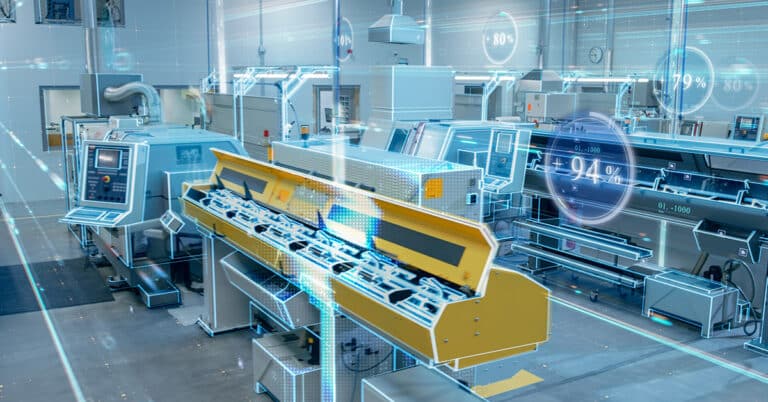Cognitive computing in manufacturing is a key technology underpinning the digital transformation of Industry 4.0 and the smart factory. As facilities increasingly adopt Industry 4.0 technology — smart sensors, 5G connectivity, edge computing capabilities, collaborative robots and more — they must ensure that they remain able to effectively use the data and analytics that they collect and generate. The same benefits on which much of the promise of Industry 4.0 is predicated can also represent significant challenges if a facility is not prepared to make use of them properly.
In addition to more data, smart factories will gain the potential of faster network infrastructure enabling near real-time analysis, and decentralized decision-making through edge computing. While these tools can yield incredibly agile and responsive decision-making, the facility must be prepared to use them effectively. Cognitive computing is one such technology that can facilitate the right information to make the right decisions at the right time.
What is cognitive computing?
Cognitive computing uses advanced algorithms, analytics and processing power to go beyond standard input/output-based computing and achieve an approximation of processes — such as reasoning, planning and learning. These processes are usually associated with people, not computers. Of course, people are still needed to synthesize the recommendations put forth by a cognitive computing system, but the system enables the analysis of much more information in a much faster duration, facilitating the effective near-real-time decision making described earlier.
Cognitive computing is frequently associated with artificial intelligence, and it is indeed an adjacent process. The primary difference is that artificial intelligence is intended to operate more independently, making decisions. On the other hand, cognitive computing in manufacturing uses deep, layered, multifaceted analytics to make recommendations for decisions and plans of action.
Why is cognitive computing needed?
The digital transformation of manufacturing and cognitive computing must become dual tools in the repertoire of any manufacturer hoping to remain nimble, efficient and competitive in the coming years. The experiences of the past several years have proven this to be true. Cognitive computing is a necessity to maintain a competitive edge, thanks to its ability to:
- Help identify and solve business challenges: Among the greatest challenges in business is the scenario where you “don’t know what you don’t know.” In the face of the best-laid plans and contingencies, unforeseen problems and disruptions can have the most devastating consequences. Recall 2019, pre-COVID — while the importance of the supply chain has long been recognized, most businesses did not have a plan in place to manage a sustained, global supply chain disruption. This severely affected 2020 and beyond. That is just one example of an area where cognitive computing can overcome subjective bias, help identify potential risks more accurately, and provide effective tools to plan for and address them.
- Provide better yields and oversight in quality control: Cognitive computing is able to draw on visuals such as photographs and technical drawings to be able to recognize acceptable and unacceptable products coming off a production line. This enables much more accurate QC, eliminating human error and fatigue while enabling true around-the-clock, end-to-end production.
- Increased manufacturing data and knowledge management: One of the primary benefits of cognitive computing is its ability to effectively “translate” mountains of data into useable, actionable tools and information. With the ability to mimic language, cognitive computing can develop drafts of process documentation, troubleshooting guides, maintenance methods and more — which can then be fine-tuned by the experts in those fields.
Cognitive manufacturing applications
Further cognitive manufacturing applications and benefits include:
- Asset performance management: Industrial performance sensors are one of the hallmark technologies in the smart factory, driving Industry 4.0. These sensors collect a massive amount of data, which can be used in many ways. One of the ways in which data is used is for centralized analysis to drive effective predictive maintenance and preventive maintenance. It can also be used in real-time monitoring in edge computing applications at the point of data collection. In both cases, cognitive computing can help analyze data and generate fast, effective potential solutions and decisions from which operators and managers can draw to act and improve facility productivity and efficiency.
- Process and quality improvement: Cognitive computing can take a deep, cohesive look at processes, performance and quality. This process generates potential improvements that — even if incremental on their own — can yield major improvements over time in productivity, quality and effectiveness metrics. Resource optimization: Cognitive computing can assist logistics personnel in taking a holistic view of the resources available in the facility — equipment, staff, inventory and more — and can help take efficiency to the next level by providing insights that even the most seasoned and effective manager may not be able to identify.
- Supply chain management: With real-time analysis of facility processes and needs — as well as insight into global supply chain trends, risks and opportunities — cognitive computing can help to facilitate fast, effective action that can yield major cost and reliability benefits while enabling more productive relationships with suppliers up and down the supply chain.
With these benefits in mind — more effective decision-making, enhanced agility, increased reliability, greater efficiency and advanced productivity — it is clear that cognitive computing is well on its way to making a major impact on the manufacturing landscape. This impact is only poised to increase, this article will help you understand how and when cognitive and smart manufacturing trends can benefit you.






